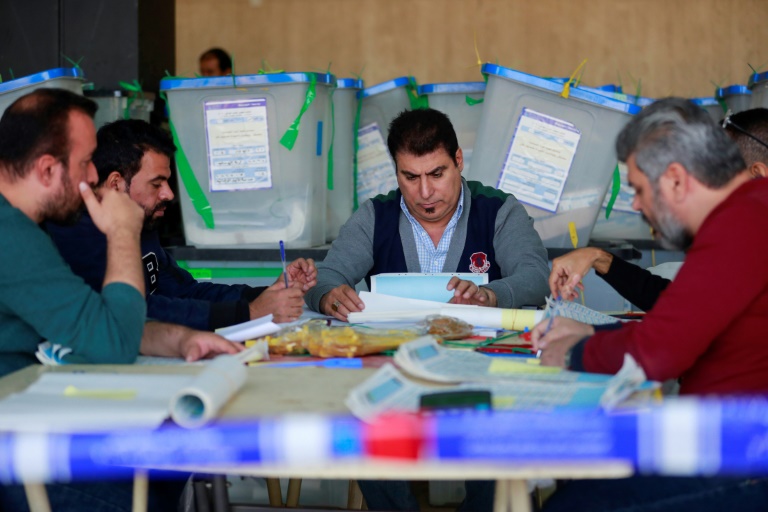Iraqi voters went to the polls more than seven weeks ago, but they are still waiting for the final results as tensions simmer in the war-scarred country.
A major rift has opened since the October 10 parliamentary vote within the camp representing Iraq’s Shiite Muslim majority over who should have a say in forming the next government.
While the movement of firebrand cleric and nationalist Moqtada Sadr made gains in the polls, some pro-Iranian Shiite factions lost support, and their backers have launched protests claiming election fraud.
Behind the scenes, powerful players are trying to hammer out what the next government might look like.
But analysts warn that — in a country still recovering from decades of war and chaos, and where most parties have armed wings — political disputes always come with the risk of military escalation.
The incumbent Prime Minister Mustafa al-Kadhemi escaped unhurt when an explosive-packed drone hit his Baghdad residence on November 7 in an attack not claimed by any group.
Here is a look at the Iraqi election and the situation now.
– Why the delay?
–
Iraqi election monitors launched the lengthy manual recounts after some parties alleged voter fraud.
Last Saturday, the electoral commission said it had finally wound up the recount of hundreds of ballot boxes.
A judicial committee has 10 days to certify the counts, after which the commission can name the winners within two days, with the result to be ratified in federal court.
According to the initial count, the big winner in the 329-seat unicameral assembly, with more than 70 seats, was the movement of Sadr.
The big loser in the Shiite camp was the Fatah (Conquest) Alliance, the political arm of the Hashed al-Shaabi former paramilitary force, since integrated in the security apparatus, which includes many pro-Iranian groups.
It lost almost two-thirds of its parliamentary bloc to gain some 15 seats, according to the preliminary results.
Hashed leaders have rejected the preliminary results as a “scam” and their supporters have held street protests chanting “No to fraud”.
Political scientist Ihsan al-Shamari said that the electoral commission’s message was clear: “To give assurance that there have been no violations and the procedures were thorough.”
– Who forms government?
–
The formation of governments has involved complex negotiations in multi-confessional and multi-ethnic Iraq ever since a US-led invasion toppled dictator Saddam Hussein in 2003.
Posts and ministries have been handed out according to compromises reached by the main blocs, rather than to reflect the numbers of seats parties have won.
While powerful blocs favour sticking with this tradition, Sadr has called for a “majority” government which, analysts say, he could try to build with Sunni and Kurdish parties.
Few analysts would dare to predict the next move of Sadr, a former leader of an anti-US militia who has often surprised observers with his political manoeuvres.
“A great deal of what Sadr does is tactical pressure, but he would also love to undermine his rivals as much as he can,” said Hamdi Malik of the Washington Institute.
“Now it’s a matter of who will back down… So far neither side has given in to pressure.
That is why the chance of escalation and clashes is high at this stage.”
Several names have been touted for prime minister including former premier Haidar al-Abadi, and Kadhemi who has good ties with power-brokers Tehran and Washington but is rejected by pro-Iran factions.
– What are the risks?
–
Major fighting has stopped in Iraq since an alliance including the Hashed defeated the Islamic State group in 2017, but sporadic violence continues.
Military bases housing US troops have been targeted with dozens of missile and drone strikes which Washington blames on pro-Iran factions.
Tensions culminated weeks after the election with the unclaimed drone attack against Kadhemi.
Shamari said that in the current manoeuvring the pro-Iran factions want to ensure both their participation in government and “immunity for their arms”, at a time when Sadr is calling for “militias” to be disbanded.
Malik said the armed factions are using the threat of violence, such as attacks on US forces if they are not withdrawn by the new year, as a political tool.
“Unless the militias are assured that they will have a strong enough presence in the parliament and the executive to be able to protect their interests, they will use military means to put pressure on their rivals,” he said.
Malik said that both the election commission and the judiciary are now under enormous pressure.
“They seem to be deliberating as to how to deal with the complaints by the militias and some other parties,” he said.
“This has turned into a very sensitive issue that could lead to serious military escalation in Iraq.”











